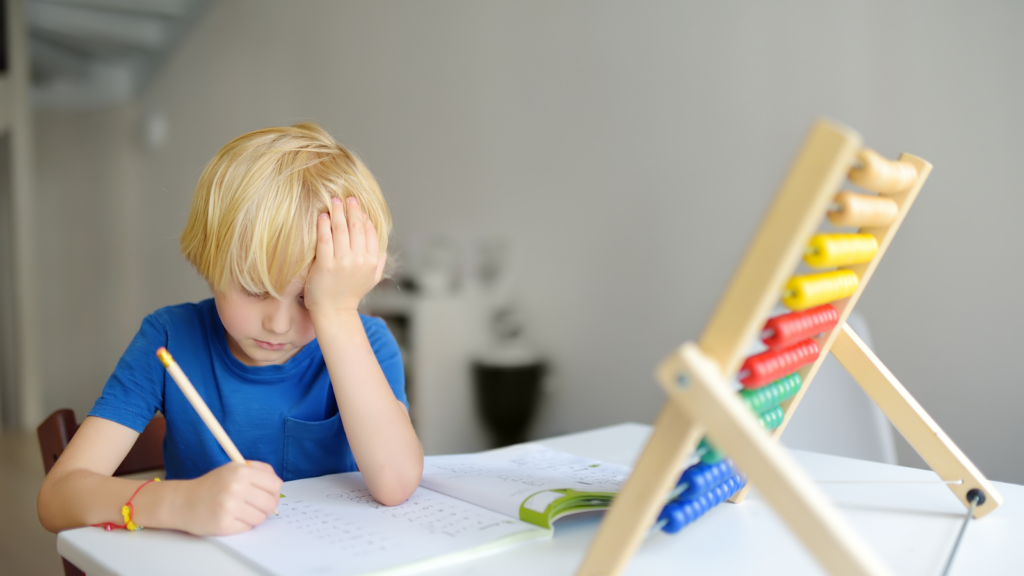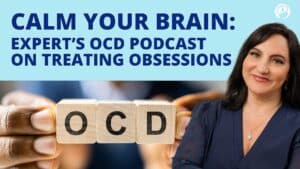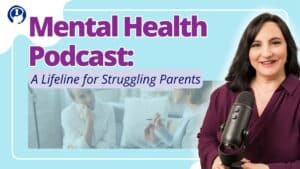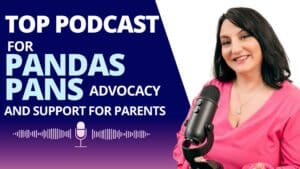ADHD or Attention Deficit Hyperactivity Disorder is a neurodevelopmental disorder characterized by inattention, hyperactivity, and impulsivity. But did you know that ADHD can also significantly impact one's short-term memory? Many individuals with ADHD may struggle with remembering details, following directions, completing tasks, and organizing their thoughts. This can often lead to frustration and even anxiety.
Understanding ADHD
To fully understand the connection between ADHD and short-term memory challenges, let's look at the key features of ADHD. ADHD is one of the most common neurodevelopmental disorders affecting children and adults. It is estimated to affect 8-10% of children and 2-5 % of adults worldwide. The symptoms of ADHD interfere with daily functioning, can include inattention, hyperactivity, impulsivity, and other different behavioral challenges.
Exploring Short-Term Memory
Short-term memory is the ability to store and retrieve information in our minds for a short period of time, usually between 15 and 30 seconds. This kind of memory is essential for daily functioning, such as remembering phone numbers, driving directions or completing tasks.
Short-term memory works in a process called encoding, storage, and retrieval. Unfortunately, when it comes to ADHD and long-term memory, individuals with ADHD may struggle to fully encode and retrieve information, leading to memory deficits. This can be due to reduced attention span, problems with time blindness, difficulty focusing, or impulsivity.
The ADHD Short-Term Memory Link
Studies have shown that for many individuals with ADHD, short-term memory issues can be significant. It is possible that low levels of certain neurotransmitters in the brain, namely dopamine and norepinephrine, may contribute to memory deficits.
Some studies have suggested that by using memory tests and magnetic resonance imaging (MRI), the regions of the brain involved in memory function are also impacted and impaired in individuals with ADHD. In real-life, those with ADHD may forget appointments, miss deadlines, or struggle to follow through with tasks and responsibilities due to memory issues and more specifically, impaired short-term memory.
Managing Short-Term Memory Issues
Fortunately, there are ways to help manage short-term memory issues in individuals with ADHD. One of the most effective strategies is to use external cues and reminders, such as setting alarms or creating visual schedules.
This can help with encoding information and providing prompts for retrieval. Additionally, breaking down tasks into smaller chunks and using techniques like repetition and association can also aid in improving short-term memory function.
Short-Term Memory Management Strategies
The great news is that there are various cognitive, behavioral, and lifestyle interventions available to manage memory deficits associated with ADHD. Cognitive strategies encompass exercises and memory techniques that can effectively enhance short-term memory function in individuals with ADHD.On the other hand, behavioral strategies involve principles like breaking down tasks into smaller steps or establishing routines to better manage daily responsibilities and tasks. Moreover, seeking support from a support group like our CALM Brain Community can provide invaluable emotional, mental, and practical assistance.
Chunking Information: Breaking down complex information into smaller, manageable parts can make it easier for children to remember and understand.
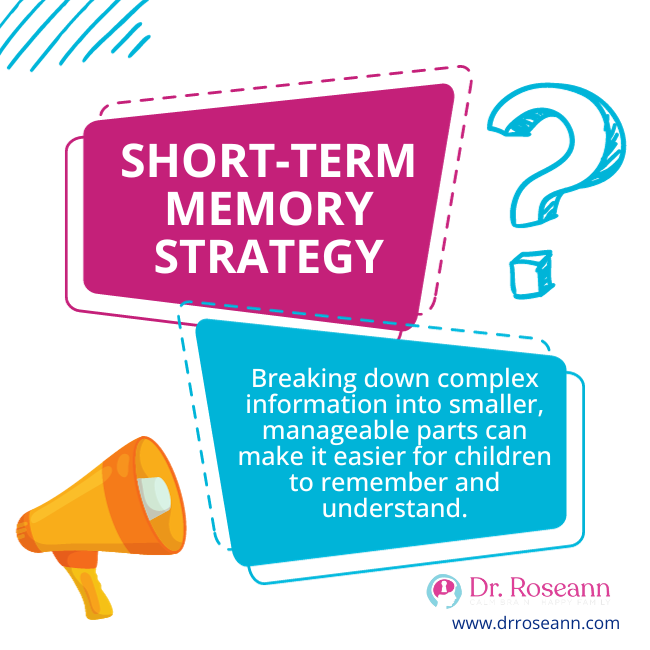
Visual Aids: Using diagrams, mind maps, and illustrations can help children visualize the information they are trying to remember, making it more memorable and an effective counter to ADHD and memory loss.
Memory Games: Activities and games that stimulate the mind, such as puzzles, crosswords, and memory card games, can improve memory and cognitive skills.
Repetition: Regularly reviewing and repeating information can reinforce memory retention.
Association: Linking new information to something familiar can help children remember it more easily.
Adequate Sleep: Ensuring that children get enough sleep is crucial for memory consolidation and learning.
Healthy Diet: A balanced diet, rich in omega-3 fatty acids, can support brain health and improve memory.
Regular Exercise: Physical activity increases blood flow to the brain and can help enhance cognitive function, including memory.
Relaxation Techniques: Techniques like deep breathing, yoga, and meditation can reduce stress and improve concentration and memory.
Magnesium: Clinical research has shown that magnesium improves cognitive functioning and attention.
Note-taking: Encouraging children to take notes can help reinforce memory and understanding of the information. The physical act of writing can also help to process information.
Continued Learning: Encouraging learning outside of the classroom can also help improve memory in people with ADHD. This could include engaging in educational activities or hobbies such as reading, puzzles, science, legos, or playing memory games.
Mindfulness and Meditation
Mindfulness is a state of active attention to the present moment without judgment. It involves focusing on your thoughts, emotions, physical sensations, and surroundings in a non-reactive manner. Research has shown that mindfulness and meditation practices can improve working memory, decrease impulsiveness, and increase emotional regulation in individuals with ADHD. It can also help reduce stress levels and improve overall well-being.
There are many resources available for incorporating mindfulness and meditation into daily life, such as guided meditations, breathing exercises, and body scans. Mindful awareness exercises can also be added into everyday activities like eating meals or walking to promote present-moment awareness.
Lifestyle Changes
Certain lifestyle changes can also have a positive impact on managing ADHD symptoms and improve working memory. Regular exercise has been shown to improve cognitive function and enhance mood, making it an effective natural treatment for ADHD.
A balanced diet, rich in proteins and complex carbohydrates, can have a significant effect on energy levels and concentration throughout the day in kids and adults with ADHD. Supplements for attention and focus can also improve memory and learning.
Additionally, maintaining a consistent sleep schedule can also help in regulating mood and maintaining focus. By creating a structured daily routine, kids gain a sense of stability and predictability, reducing anxiety and stress that is common in people with ADHD. Even though most think that there is a “one and done” or “magic pill” that addresses ADHD symptoms, the most effective approach often involves a combination of strategies.
Support from Family and Friends
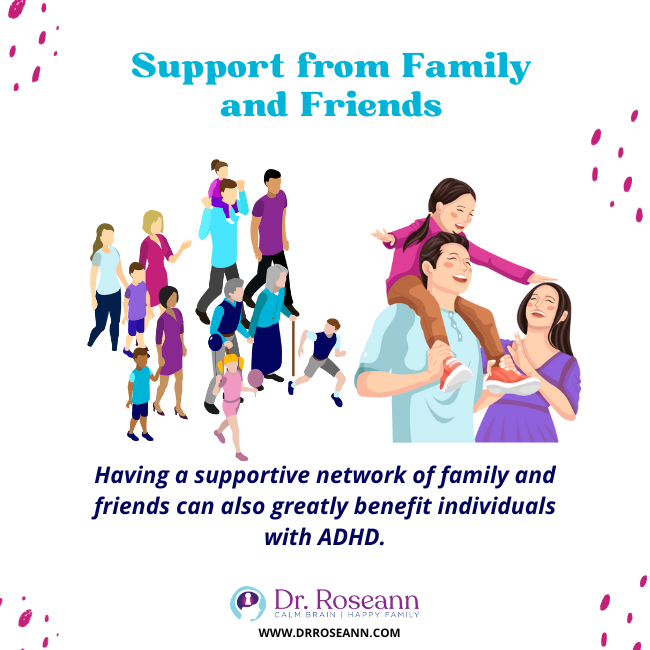
Having a supportive network of family and friends can also greatly benefit individuals with ADHD. This can include having open communication about the challenges faced, receiving encouragement and understanding, as well as practical help in managing daily tasks.
The involvement of loved ones can also be helpful in setting goals and creating accountability for staying on track with treatment plans. It's important to educate those close to you about ADHD so they can better understand and support your needs.
Furthermore, it is important for parents and educators to provide a supportive and encouraging learning environment for children. Creating a positive and stress-free environment can help children feel more motivated to learn and reduce memory problems. It is also essential to recognize individual learning styles and adapt teaching methods accordingly. Some children may benefit more from hands-on activities, while others may prefer visual aids or auditory cues.
As parents and educators, it is important to continuously educate ourselves on ways to improve memory in children and create an optimal environment for their development.
In addition to using these techniques to improve memory, it is also important to address any underlying issues that may be impacting a child's ability to remember information. These could include autism (ASD), anxiety, or other developmental disorders.
Overall, improving memory in children requires a holistic approach that involves promoting healthy habits, creating a positive learning environment, and addressing any underlying issues. With the right support and strategies in place, children can develop strong memory skills that will benefit them throughout their lives.
Technological Aids That Support Memory
In today's digital world, technology has become an ally in managing conditions like ADHD. There are several apps and devices designed specifically for individuals with ADHD that can assist in boosting memory function. These apps and devices range from simple prompts, alarms, or checklists, to more sophisticated features such as task scheduling, reminder systems, and note-taking tools.
Some popular examples include Evernote, Google Calendar, and Cozi Family Organizer. These apps can be accessed on smartphones, tablets, or computers, making them easily accessible and convenient for daily use.
In addition to apps, wearable devices like smartwatches can also be beneficial in managing ADHD symptoms. Smartwatches can send reminders and alerts throughout the day, track activity levels and sleep patterns, and provide real-time feedback to help individuals stay focused and organized. They can also serve as a useful tool for time management by setting alarms for tasks or appointments.
The Path Ahead for Supporting ADHD and Short-Term Memory Issues
The link between ADHD and short-term memory issues significantly impacts the daily routine, something many parents can relate to. Yet, there's hope – a range of cognitive, behavioral, and technological interventions are available, providing a strong base for managing memory challenges and help kids to self-regulate.
The first step is to get help for your ADHD child. Joining supportive parent groups or trying out memory-enhancing apps can make a big difference for parents helping their children through the ADHD journey. They can not only gain memory strategies but coping skills that can help in all areas of life.
It's crucial for parents to realize that using these management strategies can greatly improve the quality of life and lay the groundwork for long-term success for their children with ADHD. Advocating for the right support and gaining a better understanding of ADHD is not only a personal journey but a collective effort, leading to a more understanding and informed community.
The challenges associated with ADHD are undeniable, but with the right resources and a supportive network, there's a promising path where individuals with ADHD can thrive and unlock their full potential.
The journey of exploring various strategies, maintaining a positive outlook, and celebrating every small win is not only rewarding but empowering. The story of ADHD can shift from one of challenges to one of empowerment, resilience, and ongoing growth. So, let's continue to learn, stay optimistic, and celebrate every achievement, nurturing a brighter future for our children with ADHD.
Citations
Curatolo, P., D'Agati, E., & Moavero, R. (2010). The neurobiological basis of ADHD. Italian journal of pediatrics, 36(1), 79. https://doi.org/10.1186/1824-7288-36-79
Kofler, M. J., Singh, L. J., Soto, E. F., Chan, E. S. M., Miller, C. E., Harmon, S. L., & Spiegel, J. A. (2020). Working memory and short-term memory deficits in ADHD: A bifactor modeling approach. Neuropsychology, 34(6), 686–698. https://doi.org/10.1037/neu0000641
Ortega, R., López, V., Carrasco, X., Escobar, M. J., García, A. M., Parra, M. A., & Aboitiz, F. (2020). Neurocognitive mechanisms underlying working memory encoding and retrieval in Attention-Deficit/Hyperactivity Disorder. Scientific reports, 10(1), 7771. https://doi.org/10.1038/s41598-020-64678-x
Wilens, T. E., & Spencer, T. J. (2010). Understanding attention-deficit/hyperactivity disorder from childhood to adulthood. Postgraduate medicine, 122(5), 97–109. https://doi.org/10.3810/pgm.2010.09.2206
Are you looking for SOLUTIONS for your struggling child or teen?
Dr. Roseann and her team are all about science-backed solutions, so you are in the right place!
Grab your complimentary copy of
147 Therapist-Endorsed Self-Regulation Strategies for Children: A Practical Guide for Parents
You can get her books for parents and professionals, including: It’s Gonna Be OK™: Proven Ways to Improve Your Child’s Mental Health, Teletherapy Toolkit™ and Brain Under Attack: A Resource For Parents and Caregivers of Children With PANS, PANDAS, and Autoimmune Encephalopathy.
If you are a business or organization that needs proactive guidance to support employee mental health or an organization looking for a brand representative, check out Dr. Roseann’s professional speaking page to see how we can work together.
Dr. Roseann is a Children’s Mental Health Expert and Therapist who has been featured in/on hundreds of media outlets including, CBS, NBC, FOX News, PIX11 NYC, The New York Times, The Washington Post, Business Insider, USA Today, CNET, Marth Stewart, and PARENTS. FORBES called her, “A thought leader in children’s mental health.”

She is the founder and director of The Global Institute of Children’s Mental Health and Dr. Roseann Capanna-Hodge, LLC. Dr. Roseann is a Board Certified Neurofeedback (BCN) Practitioner, a Board Member of the Northeast Region Biofeedback Society (NRBS), Certified Integrative Mental Health Professional (CIMHP) and an Amen Clinic Certified Brain Health Coach. She is also a member of The International Lyme Disease and Associated Disease Society (ILADS), The American Psychological Association (APA), Anxiety and Depression Association of America (ADAA) National Association of School Psychologists (NASP), International OCD Foundation (IOCDF) International Society for Neurofeedback and Research (ISNR) and The Association of Applied Psychophysiology and Biofeedback (AAPB).
© Roseann-Capanna-Hodge, LLC 2023

